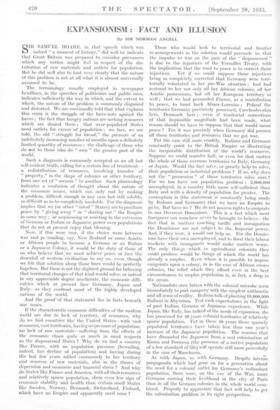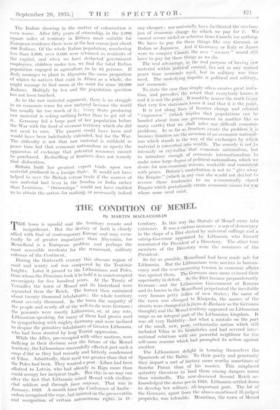EXPANSIONISM : FACT AND ILLUSION
By SIR NORMAN ANGELL SIR SAMUEL HOARE, in that speech which was indeed " a moment of history," did well to indicate that Great Britain was prepared to consider grievances which any nation might feel in respect of the dis- tribution of raw materials and outlets for population. But he did well also to hint very clearly that the nature of this problem is not at all what it is almost universally assumed to be.
The terminology usually employed in newspaper headlines, in the speeches of politicians and public men, indicates sufficiently the way in which, and the extent to which, the nature of the problem is commonly disguised and distorted. We are continually told that what explains this crisis is the struggle of the have-nots against the haves ; the fact that hungry nations arc seeking resources which are denied them ; that over-populated States need outlets for excess of population ; we face, we are told, the old " struggle for bread," the pressure of an indefinitely increasing number of mouths upon a definitely limited quantity of resources ; the challenge of those who do mot to those who do " own " the greater part of the world.
Such a diagnosis is commonly accepted as an all but self-evident truth, calling for a certain line of treatment— a redistribution of resources, involving transfer of " property," in the shape of colonies or other territory, from one set of " owners " to another. Such phraseology indicates a confusion of thought about the nature of the economic issues, which can only end by making a problem, difficult enough in any case but still soluble, so difficult as to be completely insoluble. For the diagnosis implies that we (or other " sated " States) are to purchase peace by " giving away " or " sharing out " the Empire in some way ; or acquiescing or assisting in the extension of German or Italian or Japanese power over populations that do not at present enjoy that blessing.
Now, if this were true, if the choice were between war and pt.rsuading, say, New Zealand or some Asiatic or African people to become a German or an Italian or a Japanese Colony, it would be the duty of those of us who believe that we must achieve peace or face the downfall of western civilisation to say so, even though we felt that solution along those lines would be perfectly hopeless. But there is not the slightest ground for believing that territorial changes of that kind would solve, or indeed in any appreciable degree ameliorate, the economic diffi- culties which at present face, Germany, Japan and Italy—as they confront most of the highly developed nations of the world.
And the proof "of that statement lies in facts beneath our noses.
If the characteristic economic difficulties of the modern world are due to lack of territory, of resources, why do we find countries like the United States—with vast resources, vast territories, having no pressure of population, no lack of raw materials—suffering from the effects of the economic chaos quite as much in most respects as the dispossessed States ? Why do we find a country like France, with no population pressure (bewailing, indeed, her decline of population) and having during the last few years added enormously to her territory and reserves of raw materials, also in the throes of depression and economic and financial stress ? And why do States like France and America, with all their resources and relatively sparse population, show even less sign of economic stability and health than certain small States like Sweden, Norway, Denmark, Switzerland, Finland, which have no Empire and apparently need none ? Those who would look to territorial and frontier re-arrangements as the solution would persuade us that the impulse to war on the part of the " dispossessed " is due to the injustices of the Versailles Treaty, with the implication that the road to peace is to correct those injustices. Yet if we could suppose those injustices being so completely corrected that Germany were terri- torially reinstated in her pre-War situation ; had had restored to her not only all her African colonies, all her Asiatic possessions, but all her European territory as well ; that we had persuaded France, as a contribution to peace, to hand back Alsace-Lorraine ; Poland the territories Germany previously possessed, Czechoslovakia hers, Denmark hers ;—even if territorial corrections of that impossible magnitude had been made, what reason should we have to suppose that that would Mean peace ? For it was precisely when Germany did possess all those territories and resources that we got war.
Put the case still more crudely. Italians and Germans constantly point to the British Empire as illustrating the inequitable distribution of the world's resources. Suppose we could transfer half, or even for that matter the whole of those overseas territories to Italy, Germany or Japan. Would the fact solve, or greatly help to solve, their population or industrial problems ? If so, why does not the " possession " of those territories solve ours ? For we too have our population problem : 2,000,000 unemployed, in a country little more self-sufficient than Italy and with a density of population far greater. The assumption is (the statement is constantly being made by Italians and Germans) that we have an Empire to go to. But have we ? We do not possess rights to emigrate to our Overseas Dominions. This is a fact which most foreigners can somehow never be brought to believe—the fact that in matters touching tariffs and immigration the Dominions are not subject to the Imperial power. And, if they were, it would not help us. For the Domin- ions have their own unemployed, and to flood their labour markets with immigrants would make matters worse. The only things which as agricultural colonists they could produce would be things of which the world has already a surplus. Even where it is possible to impose emigrants upon a colony, as in the case of African crown colonies, the relief which they afford even in the best circumstances to surplus population is, in fact, a drop in the ocean.
Nationalists once bitten with the colonial microbe seem immediately to part company with the simplest arithmetic and all sense of reality. Italians talk of planting 10,000,000 Italians in Abyssinia. Test such expectations in the light of past Italian, German or Japanese experience. While Japan, like Italy, has talked of the needs of expansion, she has possessed for 40 years colonial territories of relatively sparse population. Yet in those 40 years those sparsely populated territories have taken less than one year's increase of the Japanese population. The reasons that have dissuaded the Japanese from a real colonisation of Korea and Formosa (the presence of a native population of a low standard of life) will operate still more powerfully in the case of Manchuria. • As with Japan, so with Germany. Despite intense propaganda which had gone on for a generation about the need for a colonial outlet for Germany's redundant population, there. were, on the eve of the War, more Germans earning their livelihood in the city of Paris than in all the German colonies in the whole world com- bined. Properly to appreciate that fact will help to get the colonisation problem in its right perspective. The Italian showing in the matter of colonisation is even worse. After fifty years of ownership, in the 2,089 square miles of territory in Eritrea most suitable for European residence there were at the last census just about 400 Italians. Of the whole Italian population, numbering' less than 5,000, over 3,000 were returned as gayer/in-lent as residents of w the capital, and when e have deducted eMployees, children under ten, we find the total Italian Population engaged in agriculture to be 84, persons. If Italy manages to plant in Abyssinia, the same proportion of whites to natives that exist in Africa as a Whole; she might manage to find room at the most for some 20,000 Italians. MUltiply by. ten and the population qUeStion has not been touched.
As to the raw material argument, there iS no struggle in an economic sense for idyl niatrial because the world has, usually far too much of it ; every State producing 'raw Material is asking nothing better than to get rid of it. Germany fed a large part of her populatiOn before the War with the food of overseas territory which she did not need td own: The process could have been and would have been indefinitely extended,' bait for the War. The difficulty is net that raw material is withheld in peace time but that economic nationalism so upsets the apparatus of exchange that potential resources cannot of frontiers does not 'remedy be purchased. Reshuffling that dislocation.
Britain built her greatest export trade upon raw material produced in a foreign State. It would not have helped to save the British cotton trade if the sources of raw material had been in the Soudan or India rather than 'Louisiana. " OWnerships " would not have enabled ras to obtain the cotton for nothing, or necessarily indeed any cheaper ; nor materially have facilitated the mechan- ism of ' economic ;Change.' by,. Whieh we pay for it. We cannot secure nickel or asbestos from Canada for nothing. We have to pay for these things like any German. or Italian or Japanese. Anil if Germany or italy,or Jtip:i were to conqUer Ciniatia the new " owners ",would .still have to pay for these things as we do. The real adVantage, as t he real purpose of havint;:raw material within 'political ,control, lies not in any normal peace 'time"economic but in Military War '*time need. The underlying' impulse is political and military not economie.
To state the ease thus simply often creates great irrita- tion; and provokes t he retort that everybody knows it and it is not 'the It would be nearer the trtithtO,jay that very few'stateSmen .know it and that it, is thePoint. It is not along lives 'of frontier change and .eolOnial eXpansion " (Which pi ies that populations can be handed about from one government to another like"Sei many cattle) that .'we shall solve our difficult economic problems; In so far as frontiers create the problem it is beeaus. frontiers are the occasion or an economic national- ism which stands in the way of the' exchanges by Which material, is converted into wealth. The reified),is 4 116:,,It- I I intensify or ciystallisC that economic nationalism, but to introduce ' enough of economic internationalism make some large degree of political nationalism, which we desire for rion2eConoinie, reasons, workable and consistent with peace. Britain's contribution is not to ." give .away the EMpire " (which in any case she would not do) but to reverse theSe ,tendencies to an e..7.oriomietilly elnsed Empire which' gratuitously create economic causes forwar Where none need exist.







































 Previous page
Previous page